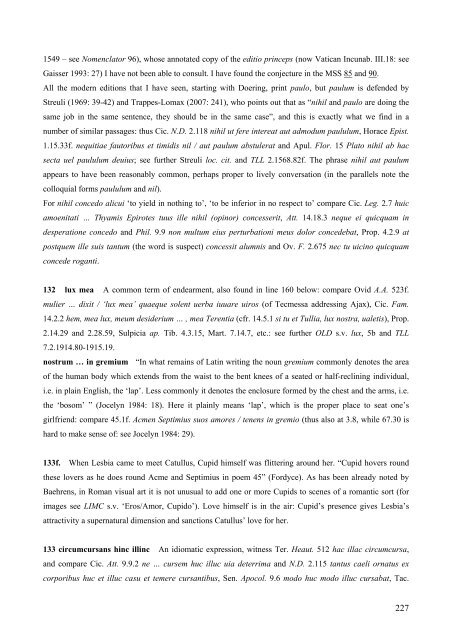CATULLUS 68 - Scuola Normale Superiore
CATULLUS 68 - Scuola Normale Superiore
CATULLUS 68 - Scuola Normale Superiore
Create successful ePaper yourself
Turn your PDF publications into a flip-book with our unique Google optimized e-Paper software.
1549 – see Nomenclator 96), whose annotated copy of the editio princeps (now Vatican Incunab. III.18: see<br />
Gaisser 1993: 27) I have not been able to consult. I have found the conjecture in the MSS 85 and 90.<br />
All the modern editions that I have seen, starting with Doering, print paulo, but paulum is defended by<br />
Streuli (1969: 39-42) and Trappes-Lomax (2007: 241), who points out that as “nihil and paulo are doing the<br />
same job in the same sentence, they should be in the same case”, and this is exactly what we find in a<br />
number of similar passages: thus Cic. N.D. 2.118 nihil ut fere intereat aut admodum paululum, Horace Epist.<br />
1.15.33f. nequitiae fautoribus et timidis nil / aut paulum abstulerat and Apul. Flor. 15 Plato nihil ab hac<br />
secta uel paululum deuius; see further Streuli loc. cit. and TLL 2.15<strong>68</strong>.82f. The phrase nihil aut paulum<br />
appears to have been reasonably common, perhaps proper to lively conversation (in the parallels note the<br />
colloquial forms paululum and nil).<br />
For nihil concedo alicui ‘to yield in nothing to’, ‘to be inferior in no respect to’ compare Cic. Leg. 2.7 huic<br />
amoenitati … Thyamis Epirotes tuus ille nihil (opinor) concesserit, Att. 14.18.3 neque ei quicquam in<br />
desperatione concedo and Phil. 9.9 non multum eius perturbationi meus dolor concedebat, Prop. 4.2.9 at<br />
postquem ille suis tantum (the word is suspect) concessit alumnis and Ov. F. 2.675 nec tu uicino quicquam<br />
concede roganti.<br />
132 lux mea A common term of endearment, also found in line 160 below: compare Ovid A.A. 523f.<br />
mulier … dixit / ‘lux mea’ quaeque solent uerba iuuare uiros (of Tecmessa addressing Ajax), Cic. Fam.<br />
14.2.2 hem, mea lux, meum desiderium … , mea Terentia (cfr. 14.5.1 si tu et Tullia, lux nostra, ualetis), Prop.<br />
2.14.29 and 2.28.59, Sulpicia ap. Tib. 4.3.15, Mart. 7.14.7, etc.: see further OLD s.v. lux, 5b and TLL<br />
7.2.1914.80-1915.19.<br />
nostrum … in gremium “In what remains of Latin writing the noun gremium commonly denotes the area<br />
of the human body which extends from the waist to the bent knees of a seated or half-reclining individual,<br />
i.e. in plain English, the ‘lap’. Less commonly it denotes the enclosure formed by the chest and the arms, i.e.<br />
the ‘bosom’ ” (Jocelyn 1984: 18). Here it plainly means ‘lap’, which is the proper place to seat one’s<br />
girlfriend: compare 45.1f. Acmen Septimius suos amores / tenens in gremio (thus also at 3.8, while 67.30 is<br />
hard to make sense of: see Jocelyn 1984: 29).<br />
133f. When Lesbia came to meet Catullus, Cupid himself was flittering around her. “Cupid hovers round<br />
these lovers as he does round Acme and Septimius in poem 45” (Fordyce). As has been already noted by<br />
Baehrens, in Roman visual art it is not unusual to add one or more Cupids to scenes of a romantic sort (for<br />
images see LIMC s.v. ‘Eros/Amor, Cupido’). Love himself is in the air: Cupid’s presence gives Lesbia’s<br />
attractivity a supernatural dimension and sanctions Catullus’ love for her.<br />
133 circumcursans hinc illinc An idiomatic expression, witness Ter. Heaut. 512 hac illac circumcursa,<br />
and compare Cic. Att. 9.9.2 ne … cursem huc illuc uia deterrima and N.D. 2.115 tantus caeli ornatus ex<br />
corporibus huc et illuc casu et temere cursantibus, Sen. Apocol. 9.6 modo huc modo illuc cursabat, Tac.<br />
227






